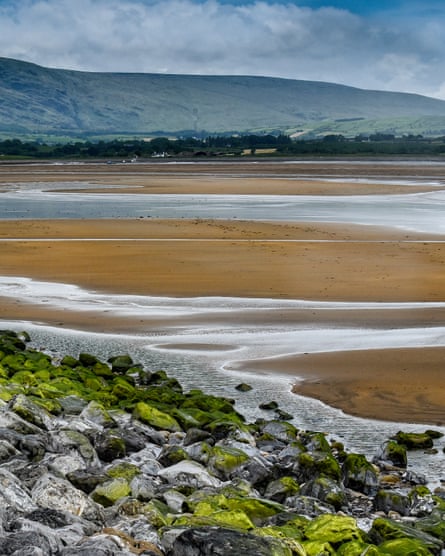It has been one of the main topics of conversation all week: can we – should we – book a holiday for 2021? And will we be able to get our money back if it does not work out?
Within hours of Boris Johnson presenting his plan on Monday to move England out of lockdown, travel websites were reporting a rush of reservations from people desperate to get a date for a break in the diary.
Caravan park owners, holiday cottage websites and the airlines reported 300% rises in bookings as the fear of missing out won the day. Despite this, booking a holiday now is something of a risk. However, you can reduce your risks considerably with the Guardian Money guide to getting away.
What do we know for certain about UK holidays?

This week’s roadmap gave some dates to get into diary, with the first important one being 12 April, which is the earliest date that those in England at least will be able to stay overnight outside their home.
It means you won’t be able to travel over the Easter holiday. But assuming infection rates have come down enough to allow ministers to approve step 2 in the roadmap, from mid-April you will be allowed to stay in self-contained accommodation, such as a holiday let, that does not have any shared indoor facilities. A holiday cottage that accommodates one family will be fine but an Airbnb in which some of the facilities such as a dining room are shared, would not.
Camping and caravanning will be allowed for those brave enough to risk the cold but, again, without shared toilet facilities – meaning you will need your own portable loo.
In England, it will be 17 May at the earliest when B&Bs, hotels, hostels and other sites with shared indoor facilities can reopen – subject to approval nearer the time.
The biggest unknowns domestically are what will happen in Wales, Scotland and Northern Ireland. Wales has yet to give any specific dates for coming out of lockdown but a Welsh government spokesperson said it was considering “the possibility of reopening self-contained accommodation for Easter”. However, it seems unlikely that English visitors would be allowed to take Easter breaks in Wales. The “stay at home” order in England lapses on 29 March but people still have to return home each night until 12 April.
The next review of restrictions in Wales will be announced on 8 March. Scotland is expected to give an update on its restrictions in mid-March. Northern Ireland is publishing its pathway to recovery next week.
Does this mean I can book UK accommodation for later in the year?
There is nothing to stop you booking anything, anywhere. Just be aware that the above dates are the earliest that the restrictions could be lifted, and could well be delayed. It is a brave person who books a nonrefundable holiday cottage for 13 April.
What do we know about foreign travel?

The absolute earliest that foreign holidays will be allowed to resume is 17 May but, again, this will only happen after a review into the safety of reopening borders is concluded. Infection rates and vaccine take-up in other countries will likely be a big factor in whether this is given the go-ahead.
Currently, there is the requirement to test travellers for Covid-19 when both leaving the UK and returning home. These measures are expected to stay in place until mid-May – as will the need to quarantine for 10 days – either in a hotel for arrivals from red list countries or at home for other travellers.
Those who are allowed to travel for essential reasons are now in most cases required to have a PCR test (£100-£175) less than 72 hours before they arrive at their destination, plus a rapid £50 antigen test less than four hours before they depart the airport, and another test on the way home. A family of four could face a testing bill almost as big as the holiday’s cost. For hotel quarantine, each adult has to pay £1,750 for the first 10 days, and £152 a day if they have to stay longer.
I’m eyeing up half-term – 31 May to 4 June – will I get away then?
Staying in the UK – if you can find room at the inn – will be the safest bet, with self-contained accommodation the most likely to be given the green light. Assuming infection rates continue to fall, England and Wales should be fully open to domestic tourists. It is harder to say what the position will be in Scotland, which has so far taken a more cautious approach.
Foreign travel is much less certain – on Wednesday the home secretary, Priti Patel, declined to say whether international travel will be able to resume this summer, saying it was “too early” to book a holiday now.
Those ignoring that advice could find themselves technically allowed to travel but subject to the Covid testing regime described above. Plenty of adults will have been vaccinated by then but many won’t have had the two doses they need to show immunity.
Most children won’t have been vaccinated and would face having to be tested. If you are determined to go ahead, you may want to opt for a package tour that is fully refundable in the event it is cancelled.
How best can I protect my money on a UK break?

Last year the Competition and Markets Authority took action against several well-known holiday cottage providers that had refused to refund customers who had been unable to use their accommodation because of lockdowns. It made it clear that anyone who finds themselves unable to travel because restrictions have not been lifted should be refunded as a matter of course. However, before you hand over the money, confirm with the company that this is the case.
Those booking on Airbnb don’t have the same protection. The US website says bookings made after March 2020 are subject to the host’s cancellation terms.
While plenty of Airbnb hosts offer cancellations up to a week before the date of travel, with generous refunds, others will take 50% or even 100% paid if you are forced to cancel, even with several weeks’ notice. The one exception to the above is if you have contracted the coronavirus, and therefore are prevented from travelling.
Note that Airbnb rarely refunds its service fees, which can be hundreds of pounds, even if you are forced to cancel because you are still locked down.
It is a similar story for hotels: you will want to find the deals with free or low-cost cancellation policies. Booking.com offers millions of 100% refundable rooms – just make sure you buy the fully refundable room you want, rather than the cheaper nonrefundable option.
Hotels are increasingly offering similar terms if you call them direct and may have more flexible cancellation policies.
Don’t hand over your credit card details until you fully understand your liability in the event the rules don’t change as quickly as promised and you are forbidden from travelling.
How can I protect my foreign holiday booking?
Over the past decade, package holidays have been falling out of favour, with travellers opting to book their flights and accommodation separately. This year, however, a package holiday could be the safest way to go – for one simple reason: if the tour operator is forced to cancel because travel restrictions are still in place, you are entitled to a full refund via the package tour regulations – in theory, within 14 days. Also if the company goes bust before you head off to the airport, you are fully protected, and claiming the money back is relatively easy.
What if I arrange my break myself?
It is those who had booked their own DIY holidays who had the toughest time getting refunds last year.
Airlines are only obliged to refund a traveller if they cancel the flight. If the flight operates but you can’t be on it because restrictions remain in place, you are unlikely to be refunded – and your insurance will very likely not pay out. Once flights resume, it is unlikely they will be cancelled in large numbers as happened in 2020.
Research by Which? found some airlines have been better than others at returning money to customers after cancelling flightsA survey it conducted in September found Ryanair and Virgin Atlantic were the worst rated by customers, with eight out of 10 saying they were dissatisfied with the refund service. In contrast, Jet2 and Tui scored highly for customer service, followed by British Airways and easyJet. Virgin Atlantic said refunds had been delayed at the height of the pandemic but since November it had been dealing with them within the seven days required by law.
If you are booking accommodation or car hire, check the cancellation terms and consider paying more for a booking that offers a refund in the event you can’t travel.
One crucial piece of advice is to book directly with the company providing the service. Many people are still waiting for refunds from online travel agents for flights they booked last year and then had cancelled. This has been a huge problem for Lastminute.com customers but also rivals such as Opodo and a host of others. Book with the airline direct, even if it costs more – and pay by credit not debit card for the extra consumer protection that provides.
Did any travel firms come out of last year’s chaos with their reputations intact?
Not many did but there were a few exceptions. A poll of 27,000 holidaymakers by MoneySavingExpert.com found that the best firms for Covid-related refunds were Travel Counsellors and Hays Travel.
Jet2 and Jet2 Holidays won praise, as did British Airways Holidays, Airbnb, Center Parcs, Disney Holidays and Trailfinders. The worst firms for refunds were deemed to be Travel Trolley, TravelUp and Teletext Holidays. You have been warned.
If I book a flight now will I be able to change it later?
Yes, but you may end up paying extra. Ryanair, for example, states on its website that it has dropped its flight change fees for bookings made before 31 March 2021 and will allow passengers to make up to two flight changes for travel up until 31 October 2021.
However, the airline had a similar policy last year and passengers who tried to avail of it complained that it turned out to be worthless as the new flights cost so much more.

Elsewhere, easyJet is offering those booking for this summer the option to transfer flights fee-free up to 14 days before departure. Again, if the new fare is higher, you will be asked to pay the difference. It has also offered a refund guarantee to quickly repay customers if it cancels the flight. Last spring, it was forcing customers to take vouchers and making refunds near impossible to get. British Airways has a similar fee-free change policy in place and is offering customers the chance to cancel and to take a voucher. The voucher has to be used by the end of April 2023.
Will I be covered by my travel insurance cover if the trip is cancelled?
The good news is that you can buy cover against having to cancel because you are ill: according to Defaqto, about 70% of insurance policies on sale will cover cancellation costs should you test positive for Covid before you travel. A third of policies – typically the more expensive ones – will pick up the holiday’s cost if you cannot go because you have formally been told to self-isolate. Most policies now cover medical expenses should you catch the coronavirus while abroad.
However, in March last year travel insurers all rewrote their policies to bar future cancellation claims from passengers prevented from travelling by the imposition of a government lockdown. So don’t expect a payout if that is why your trip is cancelled.
I have a holiday booked that was moved forward from last year – what are my rights?

Unless things change quickly, those who had a 2020 May half-term trip cancelled, and consequently rescheduled for this year, may well find it cancelled again – in which case you can ask for a full refund or a rebooking. If you are in that boat and no longer wish to travel, it is probably a case of holding your nerve and waiting for the tour operator to cancel.
It is because the tour operator is not obliged to refund you if it cancelled last year’s trip but if you agreed to a new booking this year, the new booking is deemed to be a new contract, with its own cancellation terms.
If you have an Abta refund credit note (rather than a voucher) you can ask for a cash refund at the note’s expiry date. It also retains the financial protection that you had with your original booking, meaning you are covered if the company collapses before you get to redeem it.
I don’t want to be vaccinated – will I be able to travel abroad?
You will but you may find certain avenues closed to you, and it will most likely involve expensive pre-travel Covid tests in both directions. Some countries and holiday firms may require you to have been vaccinated, and to be able to prove it.
What about vaccine passports?
Whether Britons can travel abroad this year could come down to whether they have had the Covid-19 vaccine.
The travel company Saga has already announced that customers booking one of its cruises or other breaks will not be able to get onboard without proof they have been vaccinated, and the Australian airline Qantas has said the same.
Proof may come in the form of a vaccine passport. Broadly speaking, a vaccine passport is a mobile app or similar system that can prove the bearer has been vaccinated, tested positive for Covid antibodies or recently received a negative test.
Earlier this month, British Airways said that digital health apps and wallets “will likely become commonplace when travel opens up again”. It is conducting a trial of a mobile travel health app, called VeriFLY, across all inbound international flights to the UK. The app – which is optional for passengers – allows people to combine travel verification documents and Covid-19 test results in one place.

The International Air Transport Association (IATA), which represents almost 300 airlines, was this week promoting its Travel Pass app-based system. Other systems are also undergoing trials.
The IATA Travel Pass will let people store and manage data relating to the Covid tests and vaccinations they have had.
It would involve lab and testing centre results being sent securely to the passenger’s phone. The app would check whether this meets the requirements of their destination(s) and gives a “green tick” to those who are good to go. The passenger would then be able to show their phone displaying this to airport staff and other officials.
IATA said on Wednesday that a growing list of airlines, including Air New Zealand, Etihad Airways and Singapore Airlines, had given trials, or would be conducting trials, of the Travel Pass, and it has indicated it is aiming for a full launch beginning at the end of March.
The Travel Pass will be free for passengers to download and use. It would not store any data centrally, and the plan is that there would be paper-based alternatives for those who don’t have a smartphone.
This week it emerged that Greece is in “technical” talks with the UK over allowing Britons carrying a vaccine passport to travel to its tourist hotspots from May.
But while some summer holiday hotspots appear keen to get things moving quickly, other countries have raised concerns about how the passports might work, with some worried about privacy and potential discrimination.
What are the travel experts’ holiday plans?
Tom Hall, author of Lonely Planet’s Best Ever Travel Tips: “We took a few punts on Airbnbs and self-catering for Easter and May bank holidays, more in hope than expectation that we might be able to go to Cornwall and Yorkshire, where the bookings were for. In both cases we contacted the owners in advance and talked through their cancellation policy, then made sure we had it in on an email. One of these was a rearranged booking from last year, so we’re on first-name terms. After Monday we were fortunate to be able to move the dates for the Easter booking, so, all being well, both will go ahead.
“I’m not booking anything overseas now for August but leaving a window to fit something into. There should be good availability of accommodation in many places, especially cities, with a second summer without long-haul visitors coming up. Airlines were pretty nimble last year, moving capacity as destinations opened and closed, so should move to make the most of opportunities as countries hopefully open up. The same goes for Eurostar and European rail services. We took a NightJet sleeper from Venice to Vienna last summer and it was the highlight of everyone’s year – total cost €249 for five of us and booked one day in advance. We’re hoping for something equally spontaneous this year.”
Jane Dunford, travel editor, the Guardian: “I don’t yet have any plans but will try to get away in the UK, though I might end up having to stay with friends when it’s allowed as things are booking up fast and I’m always last minute. I’m hanging out for a bit of European sunshine towards the end of summer or even autumn.”

Rory Boland, editor, Which? Travel: “There is too much financial risk to booking a holiday abroad at the moment. I already have a wallet full of unwanted travel vouchers for cancelled flights from 2020 that I don’t want to add to. I think we’ll get more positive news about travel overseas in the coming months but for now I still think booking closer to home is safer. So I’ll head to Ireland, if they’ll have me. I fancy fish and chips from Shells Cafe on the beach in Strandhill with my mom and, with a run of luck, a pint in Gerties on Lough Scur in Keshcarrigan with my dad. Simple things really but made exceptional by the year we have had. Places I love, and that in lockdown I long for.”
Daisy McAuliffe, senior events executive at the Ski Club of Great Britain: “A camping trip somewhere outside of London is an exciting prospect and hopefully I will have something booked in soon. Although, my main focus will be saving up for an epic ski trip next winter – I’m thinking Canada!”
“If a friend asked me whether they should book a trip in Europe for August, I would say it is definitely worth a shot; just make sure your booking has flexible cancellation and refund options.”
Lynsey Devon, head of the travel PR firm Heaven Publicity: “Back in December I booked a trip to Borneo for the family for the summer as I had a voucher with BA and flights were really reasonable – this is for July and I expect this will be cancelled. We booked off the beaten track, getting to the heart of the country with Rickshaw Travel, so again we are covered. We have a timeshare in Aviemore if the Borneo trip does not pan out but I am desperate to get back to mainland Europe.”
